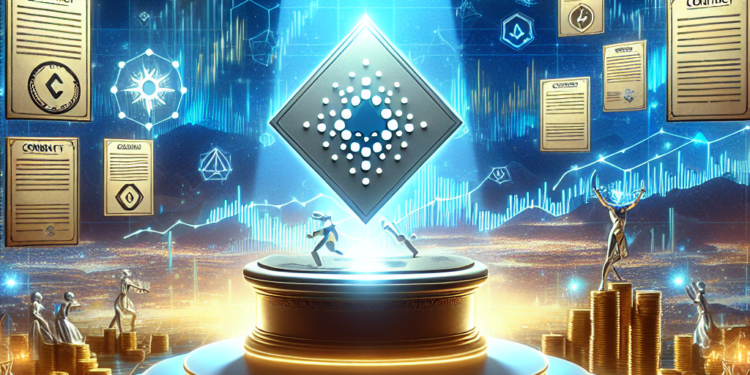In recent times, the concept of cryptocurrencies has skyrocketed, and amongst those, one name that has made a prominent place for itself is Cardano. As a third-generation cryptocurrency, it aims to tackle the issues encountered in first and second generations, like Bitcoin and Ethereum. Seizing the spotlight is its recent launch of smart contracts functionality, a technology that many believe might instigate a revolution in the crypto space.
Understanding Cardano’s Smart Contracts
Cardano is a proof-of-stake blockchain platform, the first to be founded on peer-reviewed research. Named Alonzo, the new upgrade introduces smart contracts to the Cardano blockchain, taking it to the next level. If you’re unfamiliar with the term, ‘smart contracts’ are self-executing contracts where the agreement between buyer and seller is directly written into lines of code.
This platform shift enables developers to run their decentralized applications (DApps) on the network, opening the Cardano ecosystem to countless applications including but not limited to decentralized finance (Defi), NFTs, gaming, and much more.
Comparatively, Cardano perceives itself as a more secure, scalable, and efficient blockchain than Ethereum. The smart contracts upgrade is perceived as a considerable counter to Ethereum’s dominance since it allows Cardano to host applications and projects on its blockchain, just like Ethereum.
Cardano’s Smart Contract Revolution
The smart contract revolution that Cardano is introducing is essentially a two-pronged spear. On one hand, it has profound implications for turning the card tables in the crypto world. On another, it marks the beginning of a new epoch for Cardano itself.
Internally, smart contracts mean that it can now support and execute a variety of DApps, NFTs, and DeFi platforms. These contracts promote efficiency, transparency, speed, and automation, reducing human errors and misuse. They bypass the need for a middleman, reducing operational costs and the risk of fraud.
Externally, Cardano’s move to integrate smart contracts is ground-breaking. It makes it a significant rival to the established Ethereum. With growing concerns over Ethereum’s transaction fees and scalability issues, it’s a ripe time for Cardano to seize the opportunity.
Visit DeFi Daily News to keep up with all the latest updates in this rapidly evolving sphere.
The Impact on Crypto Space
Cardano’s introduction to smart contracts has sent ripples throughout the crypto space. The potential it brings is immense and has far-reaching implications.
For starters, it could divert a substantial amount of traffic from Ethereum, which has been the go-to platform for smart contracts up until now. Second, the integration of smart contracts makes Cardano a more holistic blockchain company, possibly causing prices to surge as demand increases.
Furthermore, Cardano’s smart contracts open up a world of potential for building applications on the platform. This technology enables more secure, robust and inexpensive transactions, giving it a competitive edge over other blockchains.
Within Cardano’s Ecosystem
Amongst the potential beneficiaries within the Cardano space are DApp developers, DeFi platforms, corporations, and everyday users. It provides an environment that is ripe for startups, allowing them to leverage this advanced technology to gear up their operations and offer novel solutions.
Conclusion
With the integration of smart contracts, Cardano is set to disrupt the crypto space, challenging traditional blockchain standards and providing a more comprehensive package for developers, corporations, and everyday users. However, as it is still in the early stages, how it navigates its path to success remains to be seen.
One thing is certain – Cardano’s smart contract revolution is a testament to its commitment to growth and advancement. It marks a new beginning for the platform and a significant development in the broader crypto universe.
Frequently Asked Questions (FAQs)
1. What are Cardano’s smart contracts?
Cardano’s smart contracts are self-executing contracts where the agreement between buyer and seller is directly written into lines of code. They do not require a middleman and are designed to facilitate, verify, or enforce the negotiation or performance of a contract.
2. How does the introduction of smart contracts impact Cardano?
The introduction of smart contracts takes Cardano to the next level. It enables it to support a variety of DApps and DeFi platforms. This shift in platform means that developers can run their applications on the network, introducing a plethora of possibilities for the Cardano ecosystem.
3. How will Cardano’s smart contracts affect the crypto space overall?
Cardano’s integration of smart contracts has sent ripples across the crypto space. It has diversified its offerings and can potentially divert a significant amount of Ethereum’s traffic. The technology enhances security in transactions which makes Cardano a stronger competitor in the world of crypto.












![🚨 Warning: Bitcoin Bulls Must Reclaim $58K [Cathy Wood: Is Crypto Bull Run Over?] 🚨 Warning: Bitcoin Bulls Must Reclaim $58K [Cathy Wood: Is Crypto Bull Run Over?]](https://wp.fifu.app/defi-daily.com/aHR0cHM6Ly9pLnl0aW1nLmNvbS92aS84cDRyYXJEVXpIWS9tYXhyZXNkZWZhdWx0LmpwZw/826e6cc58333/%f0%9f%9a%a8-warning-bitcoin-bulls-must-reclaim-58k-cathy-wood-is-crypto-bull-run-over.webp?w=120&h=86&c=1&p=4698)






